Le Labo’s Growth Strategy is Their Product
Le Labo was created in 2006 by Penot and Roschi. The cult brand’s motto, which is still its guiding principle today, states that “the future of luxury resides in workmanship.” They wanted to create a product to market as an extension of who they are, and I declare that staying true to who you are is one of the hardest things to achieve. At the core of their collection are 19 genderless perfumes and 12 candles, which are supplemented by a sensorial collection of formulas for body, hair, and face, a grooming line, and detergents.
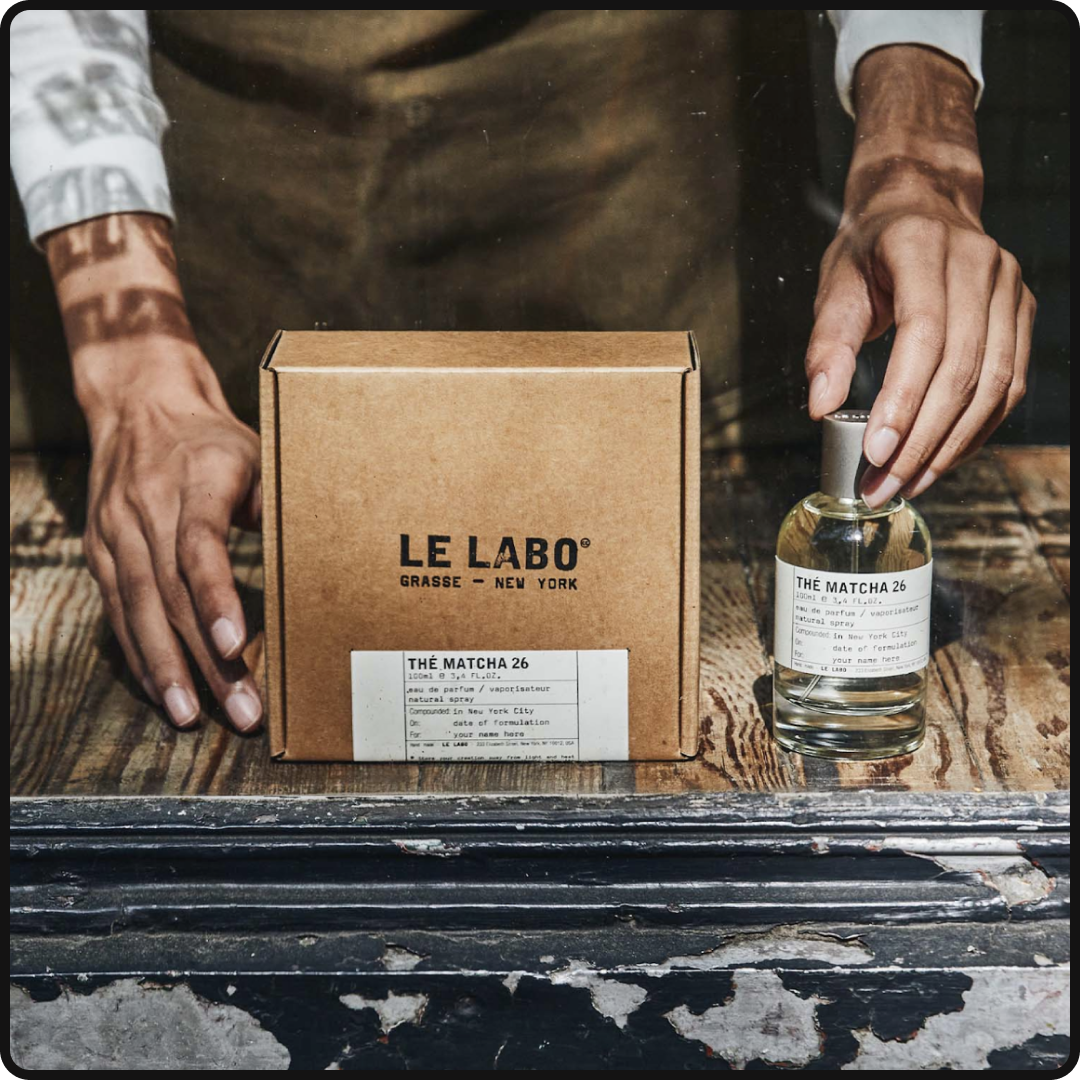
Despite being sold to Estée Lauder in 2014, the company still maintains the boutique brand attributes of artisan goods, restricted availability, and commitment to its original tenets. The goal of Le Labo’s concept for the fragrance was to promote the aroma rather than go overboard with packaging, ambassadors, ads, or media coverage. They preferred the hard way, “the organic advocacy way”.
Customer Experience for Community:
Each of Le Labo’s boutiques functions like an open artisanal laboratory designed as an entertainment park for the senses where people can take the time to smell and touch raw ingredients to awaken their olfactory system and trigger emotions. They freshly hand-blend their fragrances to the order, and each label is personalized with the date, place of the formulation, and a message chosen by the client.
Customers favor brands that use their names, are aware of their preferences, and hence offer pertinent information. To better serve the audience, a business owner must identify efficient ways to leverage client data.
Given the fierce competition brands face from their rivals for customers, it’s critical to comprehend how to grab the interest of your intended market. And client personalization may assist you in accomplishing that by offering a number of significant advantages to your company.
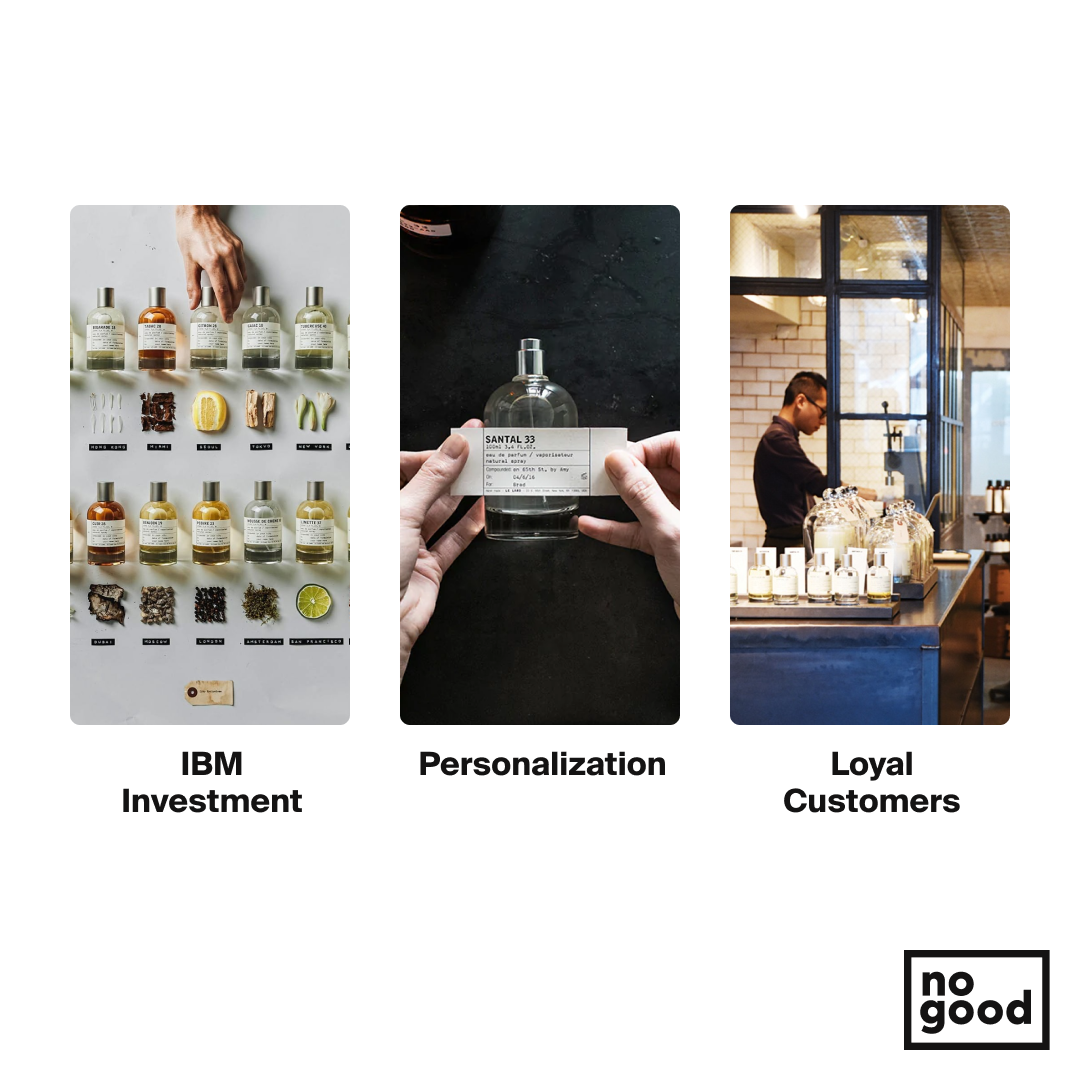
Creating soulful beauty with care through their craft of slow perfumery is the company’s heartbeat. Their approach was to create pure, clean fragrances without the typical preservatives and animal testing relied upon by some commercial competitors, paired with an in-store experience that reflected the boutique’s artisan perfumery traditions. They advocate for sustainability by responsibly sourcing their ingredients by working closely with flower harvesters, local family farms, candle pourers, and reclaimed wood artisans. Le Labo found success in building its brand by combining in-store experiences, with steadfast values in order to turn customers into advocates and build community.
Let’s Explore How:
Product Differentiation:
Le Labo set out to stand apart from the competition by differentiating itself in this industry and by paying close attention to its product development. By implementing stringent standards upon their product, Le Labo was able to build a brand that possesses the virtues of comfort and escapism, allowing their community to rediscover traditional processes as a pathway to adopt a product that was unparalleled in the field.
While traditional competitors within their space offered products that were mass-produced and widely accessible, Le Labo took a more local and focused approach — creating products that were sometimes only available in specific locations and were hand mixed to order. The results were a product experience, unlike anything anyone had ever experienced, and quickly turned customers into advocates who sang their praises within their own local communities.
Diversification:
Another growth strategy that applies to Le Labo is the diversification model. Empathy and quietness are key ingredients of their interaction with the customers. They allow them to express themselves in a way they typically aren’t able to in a conventional retail setting. It is crucial to thoroughly reduce their search and the perfume options they might test on their skin. The energy and space needed to allow the magic to unfold must be created with sensibility. Sales are only a by-product; that is their staff’s primary goal. Instead of coming in and leaving, customers are encouraged to go through the store, interact with testers, and settle on the tattered leather chairs to think about odors. The partnership between Le Labo and its clients is to offer an exploratory experience — one that is catered directly to the individual and customized at every step of the customer journey.
Know-How:
Craftsmanlike product approach with only nine ambient room scents and 18 essential perfumes available in every Le Labo standalone store and counter. Additionally, 13 unique scents are only offered in the locations that served as the inspiration for the items. For instance, Vanille 44 is only offered in Paris, and Tokyo and New York each have distinctive fragrances. Also, they are still very much in command of product development: They don’t ask outsiders for a second opinion or conduct external testing on their scents. Creation is only based on them and operates more like a dictatorship than a democracy. It’s not ideal for them to ask others what they think, especially in the case of perfumery, because doing so increases the risk of being overly influenced, diluting your vision, and producing a mass-market product. This is a great way of building true authority in your strategy by being completely transparent. Customers feel like they know exactly what they are buying and this is key for today’s market! The audience has become very demanding and they are expecting the truth and nothing but the truth. They are achieving this authority by making customers almost feel like they are creating the perfume themselves, by making the process of creating and the ingredients so available to them.
By building such authority they are achieving one more growth strategy called “Market Penetration”. In the Ansoff Matrix, growing market share in an existing market is the goal of a market penetration strategy. To increase client awareness of your services, standard methods include cutting pricing or adopting strategies like direct marketing. In Le Labo’s case, they use transparency, honesty, and exclusiveness as a way to build brand loyalty and awareness.
Alignment:
A consistent look indicates Le Labo’s distinctiveness and brand equity. The touchpoints deliver a uniform look, message, and emotion that contribute to building brand meaning. Across their website, social channels, and retail presence, there’s a specialness and attention to “craftsmanlike” detail that consistently adds to building Le Labo’s distinctiveness and brand equity.
Now you may feel like, “How are they getting all this attention and alignment without spending much time in their marketing activities?”. The answer is: Exactly because they put such detail behind every move they make and that is a significant marketing activity. They build a distinct brand by understanding that they have to protect their brand equity and not dilute it by doing celeb/brand collaborations that don’t resonate with their beliefs. They are exclusive, and thus they can’t be exclusive by implementing one size fits all marketing efforts.
Market Development:
This strategy aims to introduce everyday items into a new market. A further need might relate to a new geographic area (for instance, international growth), a new consumer demographic, or a new method of customer journey and contact, such as adding an online store to supplement your physical presence.
Le Labo achieves a market development perspective by providing a product that lends itself naturally to hospitality. With their distinctive scents and custom labeling, they are major players in the luxury hotel toiletries market. Le Labo products with a rose aroma are used at Fairmont Hotels and Resorts, Park Hyatt, and Four Seasons, and guests’ names and smart jokes are printed on bottles. The brand and the Park Hyatt New York worked together to produce the Tubereuse 40, a woody/floral scent, especially for the property. Park Hyatt St. Kitts employs Santal 33 amenities from the company, and EDITION hotels have its own exclusive Le Labo fragrance that is similar to Noir 29 and is built with fig, bay leaves, bergamot, cedar wood, black tea leaves, vetiver, and musk. They really achieved leveraging their advantage of being such a unique product by providing it to amazing hotels around the world where guests are expecting outstanding amenities and services.
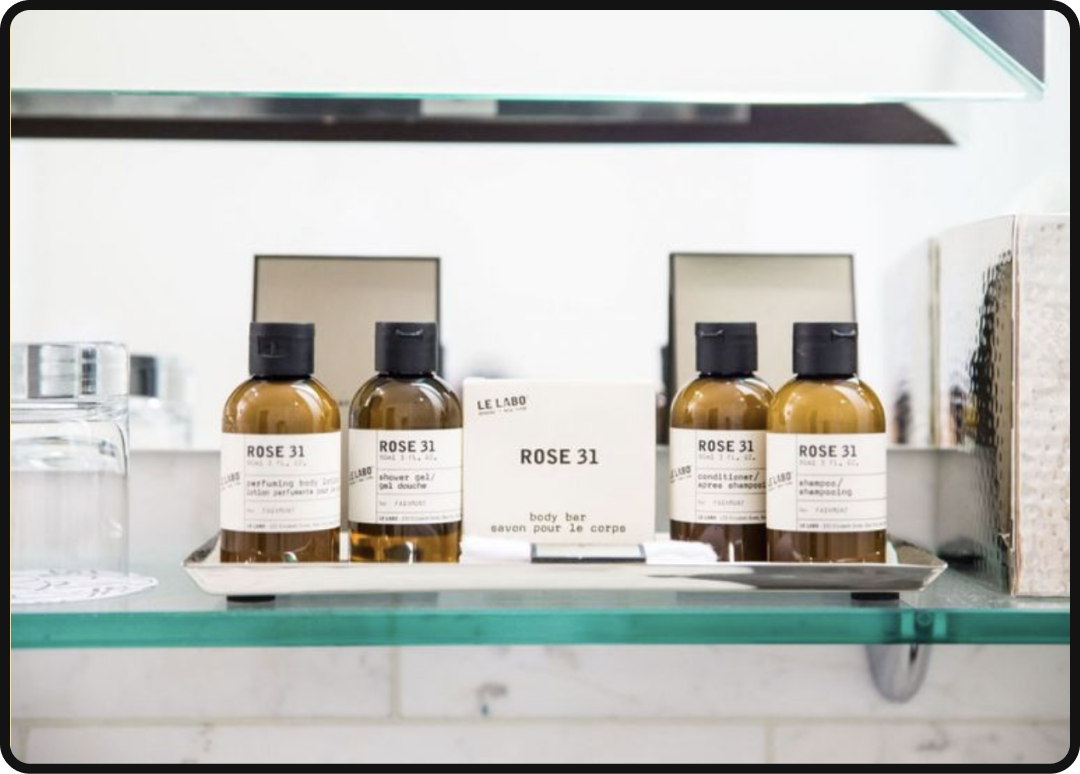
Emotional Pull:
A natural draw that goes beyond academic requirements. There isn’t a secret to success. Knowing what you’re doing increases the likelihood of creating a fantastic product, but “right place, right time, right product” plays a more significant role in the equation. The brand taps into emotions and creates an instinctive attraction beyond rational needs. Le Labo is all at once about mind, senses, and heart. It oozes feeling, appealing to our fast, frugal ‘System 1’ brain that drives much of their daily decision-making through feeling and intuition. Case in point, rather than describe their perfumes, they provide a Visual Study to create a system of images that visually represent their fragrances.
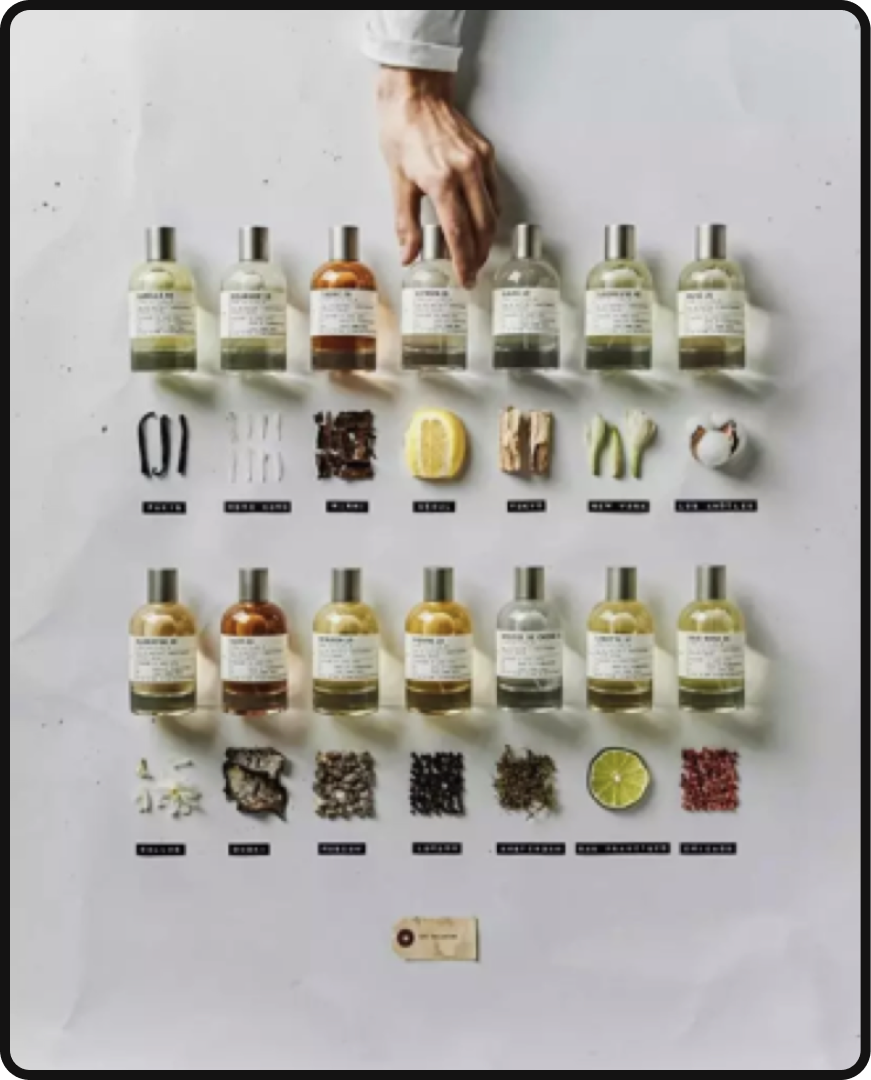
Dynamism:
Constantly moving and evolving to surprise and delight (personalization). Personalization has emerged as a significant trend across numerous industries, particularly in the beauty sector. One of the trickiest ideas to understand is how different odors affect us as individuals. This perception is influenced by various intricate elements, including our genetics, past experiences, and society. Because of this, machine learning could be highly beneficial.
With their AI, Philyra, IBM has already invested in further research into the perfume sector. Philyra imitates the fragrance-making process like a human apprentice and creates perfumes for various customer demographics and different tastes. Analyzing fragrance formulas and demographic preferences is a crucial first step. Le Labo, however, would not be concerned with mass-market sectors because they are attempting to give a unique and hand-crafted product. So how can AI explain the relationship between a variety of personality qualities and olfactory preference?
Le Labo (as well as Estée Lauder) approaches the possibility of customized perfumes in two different ways. The Proust Questionnaire, for one, aids in identifying particular character traits that are difficult to capture and study as structured data (such as your weirdest extravagance). A selection from the current scent range is then suggested to the customer after a team member has evaluated the answers to this query. The majority of this procedure is currently manual or rule-based. Second, Estée Lauder works with IBM by contributing its fragrance database to the Philyra project.
Socially and environmentally responsible:
Solid ethical dimension to all the product categories. Animal products, parabens, artificial colors, and preservatives are all absent from Le Labo products. The bottles are plain, with little more than a wraparound label imprinted with the Le Labo emblem and typewriter-style text stating the compounded date, the retailer, and the purchaser’s name.
Additionally, they have recycling and refill bottles campaign which definitely adds value to their environmentally conscious audience. Glass can be recycled indefinitely without losing any quality. Glass recycling minimizes pollutants, conserves energy, and uses less raw materials, among other environmental advantages that have been demonstrated. Additionally, because it is a ubiquitous home item, recycling the material enjoys widespread support. Overall, it is abundantly evident that using a reusable bottle is better for the environment. It is better for water in general, consumes less oil, emits less carbon dioxide, and won’t fill up landfills. Without a doubt! Let’s not forget the marketing point on that though…Making customers go back to the store and refill their bottles is also a great way to make them build relationship create loyalty, engage and interact with the brand, indulge in buying more products and feel good about it.
Limited exposure:
Their essence is niche. Le Labo is one of the most popular niche brands in sales, yet it receives little direction in marketing strategy and promotion. Compared to the other Estée Lauder brands, Le Labo is small, with more than 150 retail locations worldwide. Roschi has lauded Estée Lauder’s laissez-faire management style and emphasized that Le Labo has kept its brand management autonomy. For a very long period, they avoided doing PR and advertising. They have consistently believed that for their perfumes to be successful, they need to build genuine relationships with their customers instead. That’s all required to do. They want consumers to fall in love with their scents since, naturally, that way, they become true brand ambassadors, and establishing that relationship requires time. If you take a quick look at “Le Labo” mentioned on Tik Tok you will get it. The way Le Labo approaches their customers leads to confirming the amount of value that brings to the brand and building a community. Customers are judging and rating products and their experiences with brands every single day and they take it very seriously. The unique experience people have with Le Labo makes them want to share it on their social media and that creates an immense and invaluable amount of organic content for people to see and get easily influenced.
Last but most importantly not least, let’s discuss how they are choosing their location/demographics as part of their strategy. Le Labo may not do a lot of marketing efforts but one thing is for sure — this is intentional. Their locations are always one of the most popular neighborhoods or corners of a city (like West Village) where people have an expendable income to window shop expensive fragrances and will be encouraged to visit by word of mouth. Similar to the scents being region specific, they choose their locations for their retail stores carefully and crafter the aesthetic to draw in foot traffic. People feel even more unique by buying perfumes based on the destination they are located because as a matter of fact taste for perfume has always been different from one country to another. They make you feel like someone handcrafted a perfume for you to smell like New York or Paris — how cool is that and how often can you find that?
Based in New York City Le Labo, with its distinctive scents and custom labeling, is a major player in the luxury hotel toiletries market. Le Labo products with a rose aroma are used at Fairmont Hotels and Resorts, and guests’ names are printed on bottles. The brand and the Park Hyatt New York worked together to produce the Tubereuse 40, a woody/floral scent, especially for the property. Park Hyatt St. Kitts employs Santal 33 amenities from the company, and EDITION hotels have its own exclusive Le Labo fragrance that is similar to Noir 29 and is built with fig, bay leaves, bergamot, cedar wood, black tea leaves, vetiver, and musk.
Slow artisanal approach:
They are not interested in selling an immense amount of their products every day, since that would destroy their value proposition. They take their time and they prefer delivering to you a quality handcrafted perfume that you know its ingredients have been collected by local farmers rather than huge metallic machines. In contradiction with Estée Lauder’s broader results-orientated strategy. A “small’s” business model like Le Labo that is expanding quickly frequently lacks time to set up internal procedures to manage that expansion over the long run. The advantage of a large corporation is that it can assist you in structuring the back end so that it can operate somewhat independently. When they originally started, the entire business would stall if someone took a weeklong vacation.
Estée Lauder doesn’t interfere too much with their day-to-day operations, so they are free to open new locations and create new items as they see fit. Lastly, an important point to mention is that due to their sustainability beliefs and consciousness as a part of their strategy, their goals are not aligned with infinite growth and sales but with quality sales and boosting loyalty to their already existing market.
Human relationship:
Admit mistakes and take feedback very seriously. It’s about being genuine, owning up to your mistakes, and incorporating client input into your operations. Le Labo listens to everyone who enters their businesses without appearing overly corny and they have a very unique and honest customer acquisition journey. When the company started, they stopped using civets (a type of mammal whose intestines are widely used to make cosmetics) since one of their consumers directly asked them if the goods contained any animal ingredients. They conducted much training at points of sale that emphasizes the human side of customer care. They constantly work closely with their sales and marketing team to get more input and accept accountability when something isn’t perfect.
VRIN analysis for strategic planning:
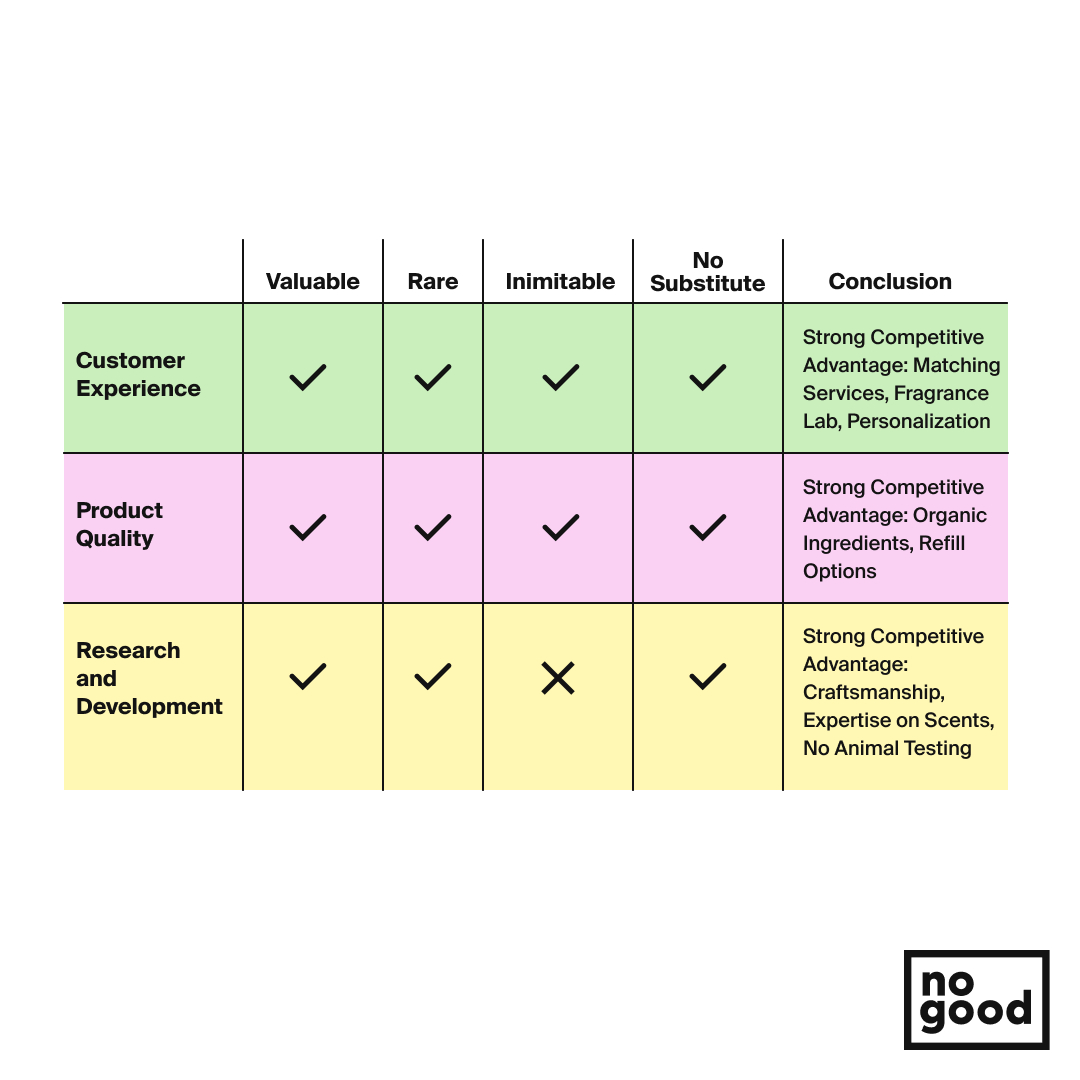
As we can see from a quick VRIN analysis Le Labo has created such a strong customer experience, product quality, and an R&D procedure that is hard to imitate in such an authentic and unique way. All of these, built consistently and aligned, have created one of the most robust and organic growth strategies I have ever seen.
Le Labo offers you a break from our digitally advanced, multi-tasking environment. You get a chance to breathe, thanks to them. It provides a sense of consolation and escape as well as the opportunity to rediscover feelings and memories once forgotten.
What Can We Learn From Le Labo?
To wrap it all up, Le Labo is one of the most exclusive and leading brands in the industry because they have a very straightforward and integrated strategy as a brand.
They clearly state their objectives and follow them along their marketing journey. Growth marketers consistently support data-driven choices. Data collection is the essential starting point, and it is important to organize it clearly so that you can more clearly describe your business goals. Gaining business growth depends on making the best decisions possible that are supported by data and by your organizational value propositions.
Monitoring your performance is always important in any kind of marketing strategy. Performance evaluation and improvement are crucial components of any process. With accurate performance tracking, you may replan your marketing efforts so that they are more effectively structured and can be recycled for the following round of campaigns.
Le Labo has proven that working to achieve a profit is not always the only way to achieve profit. Staying loyal and persistent at the top of the funnel is always the most important step before moving to the more aggressive marketing techniques. Increasing ROI should be the main goal of growth marketing but providing quality and a unique product so that people do the peer-to-peer marketing for you is the hardest. It increases potential to create a profitable ROI that will help a firm develop and grow in the long-run rather than the short-run.
Investigate, use, and scale. The growth plan approach lowers risk factors because it allows for experimentation and implementation even with tight business funds. The approach can be scaled for better results after the exact formula is found.
Growth marketing is an ongoing procedure. Being agile, staying relevant, and being true to your beliefs are as important as implementing the best data-driven marketing techniques, and Le Labo is the best example to prove that to you.






